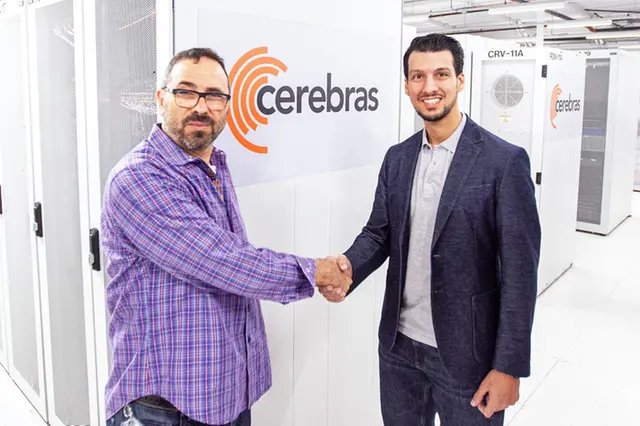Cerebras Systems, the pioneer in accelerating generative AI, and G42, the UAE-based technology holding group, today announced Condor Galaxy, a network of nine interconnected supercomputers, offering a new approach to AI compute that promises to significantly reduce AI model training time. The first AI supercomputer on this network, Condor Galaxy 1 (CG-1), has 4 exaFLOPs and 54 million cores. Cerebras and G42 are planning to deploy two more such supercomputers, CG-2 and CG-3, in the U.S. in early 2024. With a planned capacity of 36 exaFLOPs in total, this unprecedented supercomputing network will revolutionize the advancement of AI globally.
“Collaborating with Cerebras to rapidly deliver the world’s fastest AI training supercomputer and laying the foundation for interconnecting a constellation of these supercomputers across the world has been enormously exciting. This partnership brings together Cerebras’ extraordinary compute capabilities, together with G42’s multi-industry AI expertise. G42 and Cerebras’ shared vision is that Condor Galaxy will be used to address society’s most pressing challenges across healthcare, energy, climate action and more,” said Talal Alkaissi, CEO of G42 Cloud, a subsidiary of G42.
Located in Santa Clara, California, CG-1 links 64 Cerebras CS-2 systems together into a single, easy-to-use AI supercomputer, with an AI training capacity of 4 exaFLOPs. Cerebras and G42 offer CG-1 as a cloud service, allowing customers to enjoy the performance of an AI supercomputer without having to manage or distribute models over physical systems.
CG-1 is the first time Cerebras has partnered not only to build a dedicated AI supercomputer but also to manage and operate it. CG-1 is designed to enable G42 and its cloud customers to train large, ground-breaking models quickly and easily, thereby accelerating innovation. The Cerebras-G42 strategic partnership has already advanced state-of-the-art AI models in Arabic bilingual chat, healthcare and climate studies.
“Delivering 4 exaFLOPs of AI compute at FP 16, CG-1 dramatically reduces AI training timelines while eliminating the pain of distributed compute,” said Andrew Feldman, CEO of Cerebras Systems. “Many cloud companies have announced massive GPU clusters that cost billions of dollars to build, but that are extremely difficult to use. Distributing a single model over thousands of tiny GPUs takes months of time from dozens of people with rare expertise. CG-1 eliminates this challenge. Setting up a generative AI model takes minutes, not months and can be done by a single person. CG-1 is the first of three 4 exaFLOP AI supercomputers to be deployed across the U.S. Over the next year, together with G42, we plan to expand this deployment and stand up a staggering 36 exaFLOPs of efficient, purpose-built AI compute.”
A leading AI and cloud computing company based in the UAE, G42 is driving large-scale digital transformation initiatives globally. The UAE was the first nation to appoint a Minister for AI in their federal government, followed by massive investments, including the establishment of G42 research partner, Mohamed bin Zayed University of Artificial Intelligence (MBZUAI), the first post-graduate university in the world focused entirely on AI.
Training large models requires huge amounts of compute, vast datasets, and specialized AI expertise. The partnership between G42 and Cerebras delivers on all three of these elements. With the Condor Galaxy supercomputing network, the two companies are democratizing AI, enabling simple and easy access to the industry’s leading AI compute. G42’s work with diverse datasets across healthcare, energy and climate studies will enable users of the systems to train new cutting-edge foundational models. These models and derived applications are a powerful force for good. Finally, Cerebras and G42 bring together a team of hardware engineers, data engineers, AI scientists, and industry specialists to deliver a full-service AI offering to solve customers’ problems. This combination will produce ground-breaking results and turbo charge hundreds of AI projects globally.

